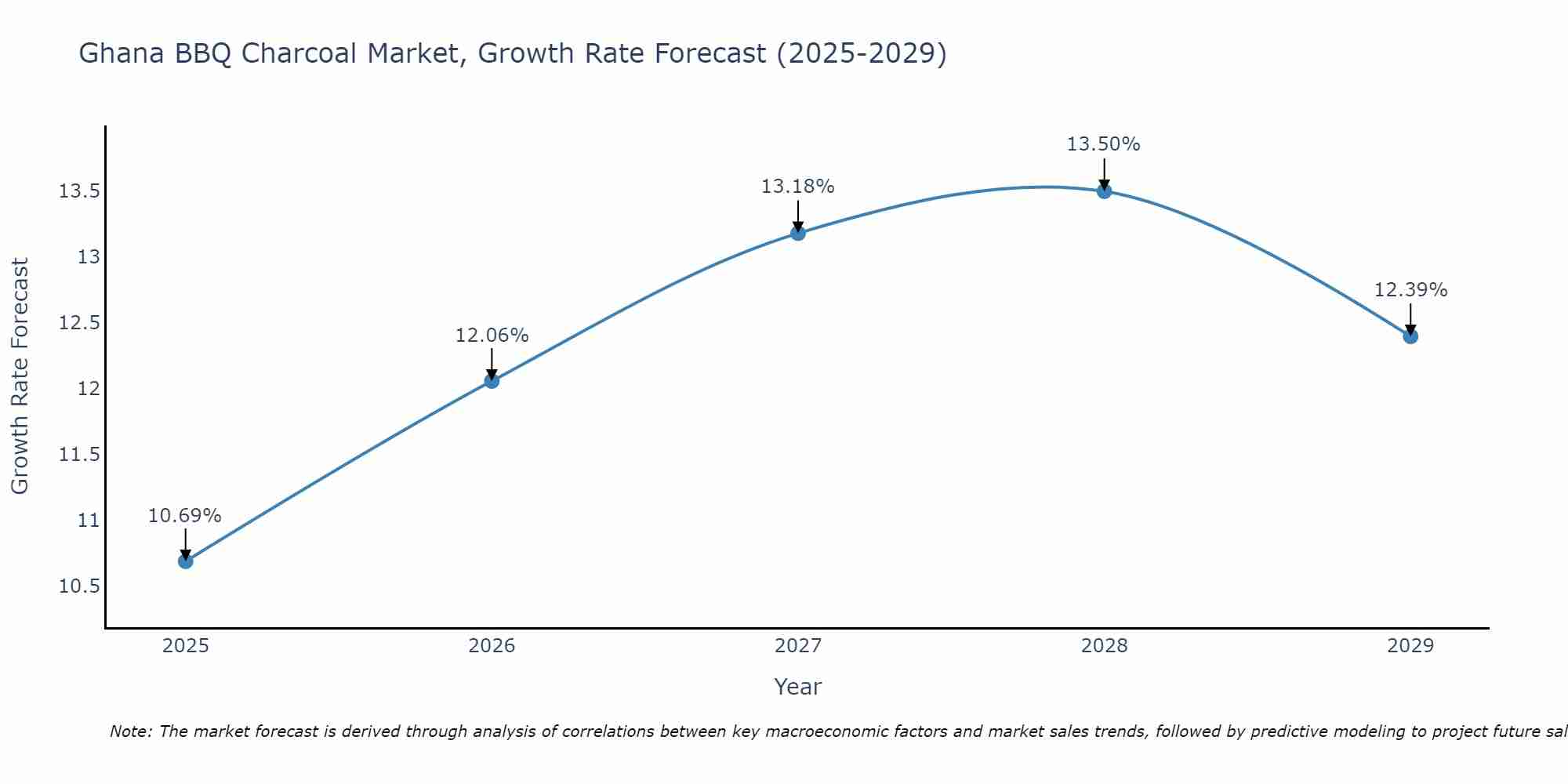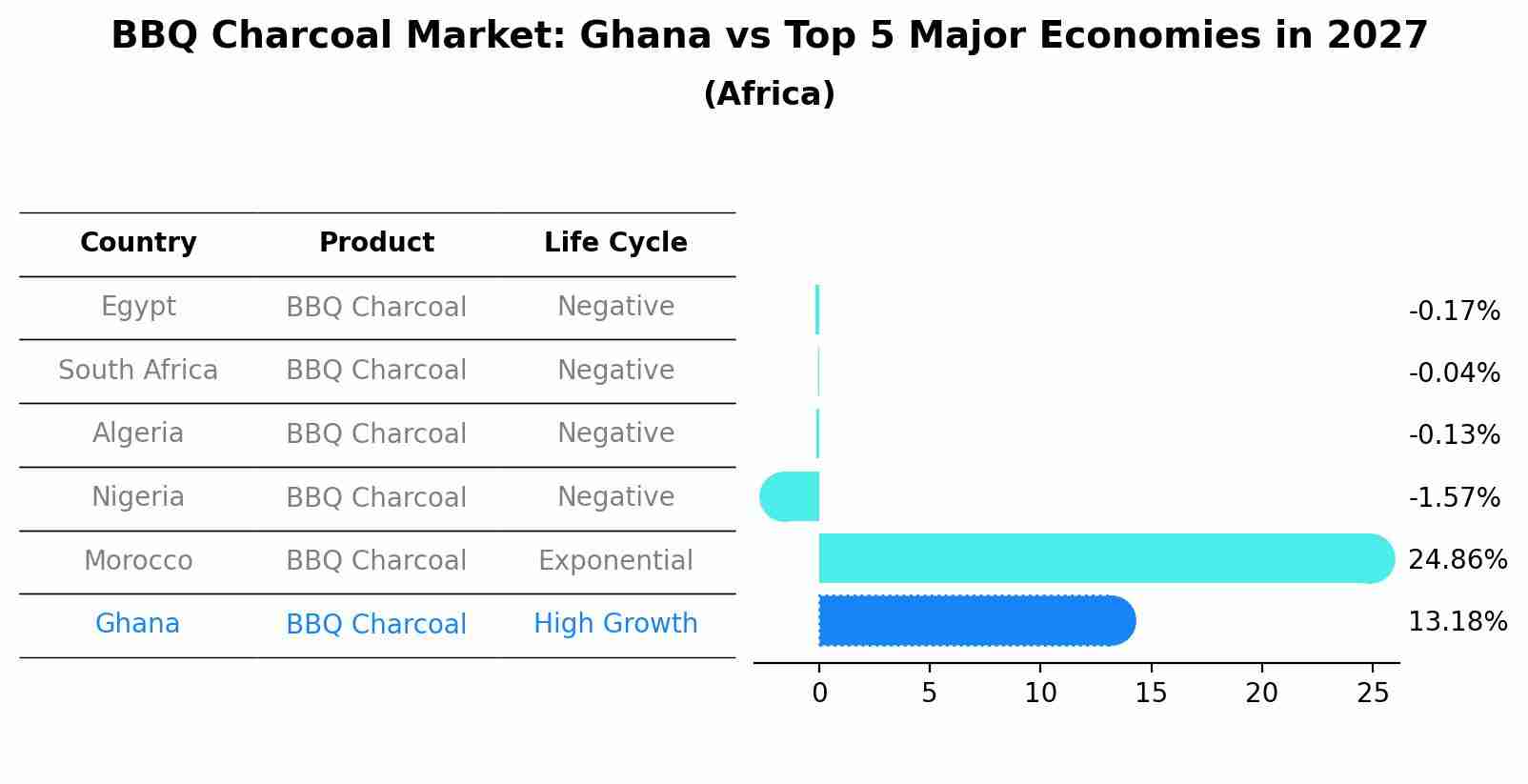Ghana BBQ Charcoal Market (2025-2031) Outlook | Size, Analysis, Companies, Share, Trends, Revenue, Forecast, Industry, Growth & Value
| Product Code: ETC375176 | Publication Date: Aug 2022 | Updated Date: Apr 2025 | Product Type: Market Research Report | |
| Publisher: 6Wresearch | Author: Shubham Padhi | No. of Pages: 75 | No. of Figures: 35 | No. of Tables: 20 |
Ghana BBQ Charcoal Market Size Growth Rate
The Ghana BBQ Charcoal Market is projected to witness mixed growth rate patterns during 2025 to 2029. The growth rate begins at 10.69% in 2025, climbs to a high of 13.50% in 2028, and moderates to 12.39% by 2029.

BBQ Charcoal Market: Ghana vs Top 5 Major Economies in 2027 (Africa)
The BBQ Charcoal market in Ghana is projected to grow at a high growth rate of 13.18% by 2027, within the Africa region led by Egypt, along with other countries like South Africa, Algeria, Nigeria and Morocco, collectively shaping a dynamic and evolving market environment driven by innovation and increasing adoption of emerging technologies.

Ghana BBQ Charcoal Market Overview
In Ghana, the BBQ Charcoal Market is driven by factors such as outdoor cooking traditions, social gatherings, and demand for natural fuel alternatives. BBQ charcoal, made from hardwood or coconut shell, offers advantages such as high heat output, long burning time, and low smoke emissions, making it popular for grilling, barbecuing, and outdoor cooking activities in Ghana culinary culture.
Drivers of the market
The BBQ charcoal market in Ghana is driven by the popularity of outdoor grilling and barbecue cooking among consumers. BBQ charcoal, made from hardwoods such as oak, hickory, and mesquite, offers high heat output, long burning times, and smoky flavor characteristics, enhancing the grilling experience and food flavor.
Challenges of the market
The Ghana BBQ charcoal market encounters challenges such as deforestation, environmental sustainability, and quality control. BBQ charcoal, derived from wood and agricultural residues, is widely used for grilling and outdoor cooking activities. However, unsustainable charcoal production practices, including illegal logging and forest degradation, contribute to deforestation and environmental degradation in Ghana. Moreover, ensuring product quality, consistency, and safety standards while adhering to regulatory requirements and consumer preferences can be challenging for charcoal producers and distributors. Additionally, addressing concerns about air pollution, carbon emissions, and indoor air quality associated with charcoal combustion may influence consumer purchasing decisions and market demand. Overcoming these challenges through sustainable charcoal production practices, certification schemes, and public awareness campaigns is essential to promote environmental conservation and responsible consumption in the BBQ charcoal market in Ghana.
Government Policy of the market
Government interventions in the BBQ charcoal market may aim to promote sustainable forest management, environmental conservation, and public health through regulations and incentives for charcoal production, distribution, and consumption. Policies might include forestry regulations to regulate charcoal production and prevent deforestation and forest degradation, taxation or subsidies to encourage sustainable charcoal production practices and forest conservation initiatives, and public awareness campaigns to promote safe and responsible charcoal use for BBQ and cooking purposes.
Key Highlights of the Report:
- Ghana BBQ Charcoal Market Outlook
- Market Size of Ghana BBQ Charcoal Market, 2024
- Forecast of Ghana BBQ Charcoal Market, 2031
- Historical Data and Forecast of Ghana BBQ Charcoal Revenues & Volume for the Period 2021-2031
- Ghana BBQ Charcoal Market Trend Evolution
- Ghana BBQ Charcoal Market Drivers and Challenges
- Ghana BBQ Charcoal Price Trends
- Ghana BBQ Charcoal Porter's Five Forces
- Ghana BBQ Charcoal Industry Life Cycle
- Historical Data and Forecast of Ghana BBQ Charcoal Market Revenues & Volume By Form for the Period 2021-2031
- Historical Data and Forecast of Ghana BBQ Charcoal Market Revenues & Volume By Briquettes BBQ Charcoal for the Period 2021-2031
- Historical Data and Forecast of Ghana BBQ Charcoal Market Revenues & Volume By Lump Wood BBQ Charcoal for the Period 2021-2031
- Historical Data and Forecast of Ghana BBQ Charcoal Market Revenues & Volume By Sales Channel for the Period 2021-2031
- Historical Data and Forecast of Ghana BBQ Charcoal Market Revenues & Volume By Direct BBQ Charcoal Sales for the Period 2021-2031
- Historical Data and Forecast of Ghana BBQ Charcoal Market Revenues & Volume By Retail BBQ Charcoal Sales for the Period 2021-2031
- Historical Data and Forecast of Ghana BBQ Charcoal Market Revenues & Volume By End User for the Period 2021-2031
- Historical Data and Forecast of Ghana BBQ Charcoal Market Revenues & Volume By BBQ Charcoal for Hotels, Restaurants and Catering (HoReCa) for the Period 2021-2031
- Historical Data and Forecast of Ghana BBQ Charcoal Market Revenues & Volume By BBQ Charcoal for Households for the Period 2021-2031
- Historical Data and Forecast of Ghana BBQ Charcoal Market Revenues & Volume By Source for the Period 2021-2031
- Historical Data and Forecast of Ghana BBQ Charcoal Market Revenues & Volume By BBQ Charcoal made from Agricultural Waste for the Period 2021-2031
- Historical Data and Forecast of Ghana BBQ Charcoal Market Revenues & Volume By BBQ Charcoal made from Coconut Shells for the Period 2021-2031
- Historical Data and Forecast of Ghana BBQ Charcoal Market Revenues & Volume By BBQ Charcoal made from Nutshells for the Period 2021-2031
- Historical Data and Forecast of Ghana BBQ Charcoal Market Revenues & Volume By BBQ Charcoal made from Hardwood for the Period 2021-2031
- Historical Data and Forecast of Ghana BBQ Charcoal Market Revenues & Volume By BBQ Charcoal made from Bamboo for the Period 2021-2031
- Ghana BBQ Charcoal Import Export Trade Statistics
- Market Opportunity Assessment By Form
- Market Opportunity Assessment By Sales Channel
- Market Opportunity Assessment By End User
- Market Opportunity Assessment By Source
- Ghana BBQ Charcoal Top Companies Market Share
- Ghana BBQ Charcoal Competitive Benchmarking By Technical and Operational Parameters
- Ghana BBQ Charcoal Company Profiles
- Ghana BBQ Charcoal Key Strategic Recommendations
Frequently Asked Questions About the Market Study (FAQs):
- Single User License$ 1,995
- Department License$ 2,400
- Site License$ 3,120
- Global License$ 3,795
Search
Related Reports
- ASEAN Bearings Market (2025-2031) | Strategy, Consumer Insights, Analysis, Investment Trends, Opportunities, Growth, Size, Share, Industry, Revenue, Segments, Value, Segmentation, Supply, Forecast, Restraints, Outlook, Competition, Drivers, Trends, Demand, Pricing Analysis, Competitive, Strategic Insights, Companies, Challenges
- Europe Flooring Market (2025-2031) | Outlook, Share, Industry, Trends, Forecast, Companies, Revenue, Size, Analysis, Growth & Value
- Saudi Arabia Manlift Market (2025-2031) | Outlook, Size, Growth, Trends, Companies, Industry, Revenue, Value, Share, Forecast & Analysis
- Uganda Excavator, Crane, and Wheel Loaders Market (2025-2031) | Strategy, Consumer Insights, Analysis, Investment Trends, Opportunities, Growth, Size, Share, Industry, Revenue, Segments, Value, Segmentation, Supply, Forecast, Restraints, Outlook, Competition, Drivers, Trends, Demand, Pricing Analysis, Competitive, Strategic Insights, Companies, Challenges
- Rwanda Excavator, Crane, and Wheel Loaders Market (2025-2031) | Strategy, Consumer Insights, Analysis, Investment Trends, Opportunities, Growth, Size, Share, Industry, Revenue, Segments, Value, Segmentation, Supply, Forecast, Restraints, Outlook, Competition, Drivers, Trends, Demand, Pricing Analysis, Competitive, Strategic Insights, Companies, Challenges
- Kenya Excavator, Crane, and Wheel Loaders Market (2025-2031) | Strategy, Consumer Insights, Analysis, Investment Trends, Opportunities, Growth, Size, Share, Industry, Revenue, Segments, Value, Segmentation, Supply, Forecast, Restraints, Outlook, Competition, Drivers, Trends, Demand, Pricing Analysis, Competitive, Strategic Insights, Companies, Challenges
- Angola Excavator, Crane, and Wheel Loaders Market (2025-2031) | Strategy, Consumer Insights, Analysis, Investment Trends, Opportunities, Growth, Size, Share, Industry, Revenue, Segments, Value, Segmentation, Supply, Forecast, Restraints, Outlook, Competition, Drivers, Trends, Demand, Pricing Analysis, Competitive, Strategic Insights, Companies, Challenges
- Israel Intelligent Transport System Market (2025-2031) | Strategy, Consumer Insights, Analysis, Investment Trends, Opportunities, Growth, Size, Share, Industry, Revenue, Segments, Value, Segmentation, Supply, Forecast, Restraints, Outlook, Competition, Drivers, Trends, Demand, Pricing Analysis, Competitive, Strategic Insights, Companies, Challenges
- Uganda Precast and Aggregate Market (2025-2031) | Strategy, Consumer Insights, Analysis, Investment Trends, Opportunities, Growth, Size, Share, Industry, Revenue, Segments, Value, Segmentation, Supply, Forecast, Restraints, Outlook, Competition, Drivers, Trends, Demand, Pricing Analysis, Competitive, Strategic Insights, Companies, Challenges
- Australia IT Asset Disposal Market (2025-2031) | Strategy, Consumer Insights, Analysis, Investment Trends, Opportunities, Growth, Size, Share, Industry, Revenue, Segments, Value, Segmentation, Supply, Forecast, Restraints, Outlook, Competition, Drivers, Trends, Demand, Pricing Analysis, Competitive, Strategic Insights, Companies, Challenges
Industry Events and Analyst Meet
Our Clients
Whitepaper
- Middle East & Africa Commercial Security Market Click here to view more.
- Middle East & Africa Fire Safety Systems & Equipment Market Click here to view more.
- GCC Drone Market Click here to view more.
- Middle East Lighting Fixture Market Click here to view more.
- GCC Physical & Perimeter Security Market Click here to view more.
6WResearch In News
- Doha a strategic location for EV manufacturing hub: IPA Qatar
- Demand for luxury TVs surging in the GCC, says Samsung
- Empowering Growth: The Thriving Journey of Bangladesh’s Cable Industry
- Demand for luxury TVs surging in the GCC, says Samsung
- Video call with a traditional healer? Once unthinkable, it’s now common in South Africa
- Intelligent Buildings To Smooth GCC’s Path To Net Zero













